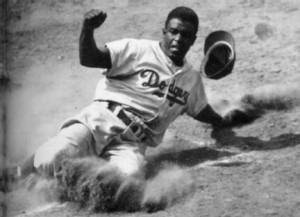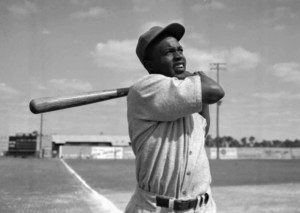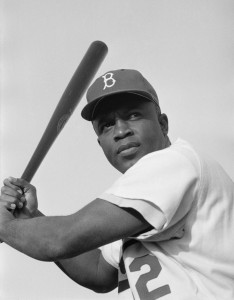It is hard to believe that the grandson of a slave and the son of a sharecropper would go on to become baseball’s civil rights legend and not only change the way we look at sports but also the way we look at race relations in the United States. Jackie Roosevelt Robinson was ambitious, determined, and fearless on his journey to break through the prevailing race barriers of his time.
Born in a cabin in Cairo, Georgia, on January 31, 1919 and one of four children in the Robinson family, Jackie grew up extremely poor. The Robinsons sharecropped for a white family called the Sassers, where they planted and grew crops in exchange for a place to live. Six months into Jackie’s life, his father deserted the family and soon after, Marlie Robinson, Jackie’s mother, decided to move to Pepper Street in Pasadena, California with the hope of giving her children a better life. Soon, Jackie realized his athletic ability, and the rest was history.
As a teen, Jackie joined a neighborhood gang, but was told by an older friend “that it didn’t take guts to follow the crowd, that courage and intelligence lay in being willing to be different.” Soon Jackie flipped his life around and at UCLA, Robinson was the first person to letter in baseball, football, basketball, and track in the school’s history. However, Jackie’s courage in standing for civil rights really showed itself during his time in the army.  After being drafted in 1942, Robinson and boxer Joe Louis created an officer candidate school for African-American soldiers. While serving, he was threatened with court-martial, which he eventually beat, for not getting up to move to the back of a bus.
After being drafted in 1942, Robinson and boxer Joe Louis created an officer candidate school for African-American soldiers. While serving, he was threatened with court-martial, which he eventually beat, for not getting up to move to the back of a bus.
After his tour of duty, Jackie left the military with the rank of second lieutenant. Later on while playing baseball for the Monarchs of the Negro American Baseball League, Branch Rickey, manager of the Brooklyn Dodgers, saw Jackie as the perfect candidate to fulfill his vision of bringing African-Americans in into league. In 1947, his first year with the Dodgers, Robinson earned rookie of the year and even though some people respected Robinson for his abilities and courage, others issued him death threats. During Robinson’s ten year career with the Brooklyn Dodgers, the team won a total of six national league titles, the World Series in 1955 and he personally won the title of most valuable player in the league in 1949. He retired with a .311 batting average and stole home 19 times.
The chronicler of myth, Joseph Campbell, believes that there are three stages in the hero’s journey. The first is departure, followed by initiation and return. In the eyes of Campbell, the hero reluctantly departs on a journey in which he faces the unknown. Jackie crossed  the threshold of racial boundaries in the United States, thereby leaving the ordinary and familiar world for the unfamiliar and uncharted one. He learned through his suffering while facing an eclectic bunch of confrontations, even including the possibility of death.
the threshold of racial boundaries in the United States, thereby leaving the ordinary and familiar world for the unfamiliar and uncharted one. He learned through his suffering while facing an eclectic bunch of confrontations, even including the possibility of death.
After examining the actions and life of Jackie Robinson it becomes clear that he is both a highly moral individual, as well as highly competent. In the words of Rev. Jesse Jackson, “Jackie Robinson’s impact was greater than just that of baseball. He was a transforming agent and in the face of such hostility and such meanness and violence, he did it with such amazing dignity. He had to set the course for the country,” Robinson was strong, resilient, charismatic, and inspiring, many qualities that make up the great eight of characteristics for a hero.
However, these qualities were not just present during his years playing baseball. After he retired from the sport, he used his unique position and fame as a platform to call for an end to racial injustice. His work with the National Association for the Advancement of Colored People and with the Southern Christian Leadership Council helped create many new opportunities for african-americans as he spoke on the injustices of racial segregation.
It was in the year 1962, his first year of eligibility, that Robinson was elected to the Baseball Hall of Fame. Jackie Robinson’s actions both on and off the field served as a means of inspiration to a whole generation of minorities who were in desperate need of a hero of their own. His breaking of the baseball color line helped to also break various other color lines all across the United States. His unbending principles and control under this intense and demanding role was equally balanced against his passion for winning. Because of this, Jackie Robinson is a hero for both the sport of baseball and all African-Americans.

This article gave a very insightful background to Jackie Robinson. I liked how Jackson related Jackie Robinson’s life and actions to the hero’s cycle and identified some of the “Great Eight” qualities associated with Robinson. Furthermore, I liked how Jackson described Robinson’s work after his baseball career. By telling us his whole journey, from the beginning, growing up very poor to the work he did for the NAACP, the essay itself finishes off the hero’s cycle.
I agree with Cheuk. I felt that you clearly illustrated how Jackie Robinson’s life mirrors the hero’s journey. In particular, I really liked how you described the point in which Robinson crosses the threshold into the unknown to be later in his life when he was dealing with racial discrimination. By mentioning the racial discrimination, you highlight Robinson’s heroic aspects and demonstrate why he was such a great hero.
I think this blog was really well written and very nicely summed up Jackie’s hero journey. I like that you brought Joseph Campbell’s ideas into it and were able to connect them to Jackie’s life and career. He might not come to someone’s mind at first as a hero, but you explain very well how he should be considered one.
I think you did a good job of capturing his true heroic essence as a hero in both the world of sports and the world of civil rights.